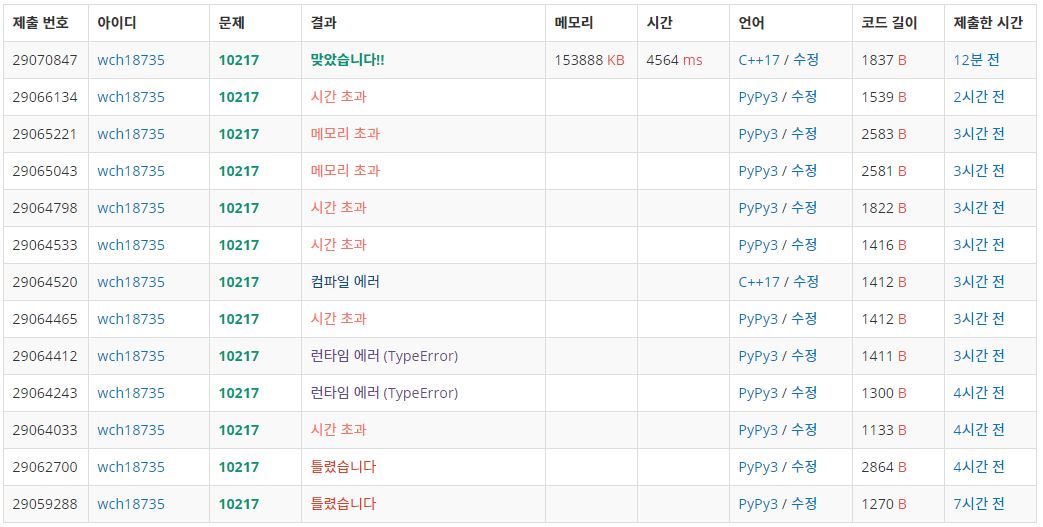[Algorithm Problem] KCM Travel (BAEKJOON: 10217번)
KCM Travel
하루 종일, 정말 하루 종일 이것만 푼 것 같았는데 답은 결국 C++ 이었습니다.

간단하진 않았습니다. 다익스트라 알고리즘에 해당 노드에 도달했을 때, 최소 비용이 아닌 경우를 제외하는 다이나믹 프로그래밍 개념을 적용해 풀었습니다. 오랜만에 C++를 잡아보니 어색한 것이 많았습니다.
priority_queue & tuple
priority_queue<자료형,컨테이너,비교기준> 을 통해 다익스트라 알고리즘에서 후보들 중 가장 짧은 노드를 찾는 우선순위 큐를 만들었습니다. 여기에 한 가지 더 활용된 것이 <tuple> 입니다. C++에서 문제를 풀 때, <pair>를 사용하여 자료형을 만들 때, 조금 복잡해지는 경우가 있습니다. 이럴 때 튜플 자료형을 사용하면 조금 더 접근이 쉬워질 것입니다.
C++ 소스코드
기억하면 좋을 스킬은 아래와 같습니다.
- get<index>(tuple)
- const int MAXNUM = 123456789
- fill(&array[0][0], &array[0][0] + sizeof(array) / sizeof(array[0][0]), integer)
#include <iostream>
#include <tuple>
#include <algorithm>
#include <queue>
#include <vector>
using namespace std;
// 자료형 정의
typedef tuple<int, int, int> next_info;
vector<next_info> tickets[10001];
int dp[101][10001];
const int MAXNUM = 123456789;
int main(int argc, char* argv[])
{
int T;
cin >> T;
for (int test_case = 1; test_case <= T; test_case++)
{
int N, M, K;
cin >> N >> M >> K;
// 초기화
fill(&dp[0][0], &dp[0][0] + sizeof(dp) / sizeof(dp[0][0]), MAXNUM);
for (int i = 1; i <= M; i++) tickets[i].clear();
// 인접 노드 입력
for (int i = 0; i < K; i++)
{
int u, v, c, d;
cin >> u >> v >> c >> d;
tickets[u].push_back({ v,c,d });
}
// dijkstra 위한 큐
priority_queue<next_info, vector<next_info>, greater<next_info>> pq;
// dp 초기화 (total time, total cost, node number)
dp[1][0] = 0;
pq.push({ 0, 0, 1 });
while (!pq.empty())
{
int current_time = get<0>(pq.top());
int current_cost = get<1>(pq.top());
int current_node = get<2>(pq.top());
pq.pop();
for (int adj_idx = 0; adj_idx < (int)(tickets[current_node].size()); adj_idx++)
{
next_info ni = tickets[current_node][adj_idx];
int next_node = get<0>(ni);
int next_cost = current_cost + get<1>(ni);
int next_time = current_time + get<2>(ni);
// 가능한 수량을 초과할 때
if (next_cost > M) continue;
// dp[next_node][next_cost] > next_time 이 아닐 때
if (dp[next_node][next_cost] <= next_time) continue;
// dp 업데이트
dp[next_node][next_cost] = next_time;
pq.push({ next_time, next_cost, next_node });
}
}
// 정답 확인
int answer = MAXNUM;
for (int i = 1; i <= M; i++) answer = min(answer, dp[N][i]);
if (answer == MAXNUM) cout << "Poor KCM\n";
else cout << answer << '\n';
}
return 0;
}
Python 소스코드
같은 로직인데 안 풀리니 너무 아쉽네요.
from heapq import heappop, heappush
# test case
T = int(input())
for test_case in range(1, T + 1):
# 노드 수, 총 지원비용, 간선 개수
N, M, K = map(int, input().split(' '))
# 인접 노드
adj_node_list = [[] for _ in range(N + 1)]
# [도착노드][사용한 비용] <- 걸린 시간
dp = [[float('inf') for i in range(M + 1)] for j in range(N + 1)]
for _ in range(K):
# 출발, 도착, 비용
u, v, c, d = map(int, input().split(' '))
# 인접 노드 추가
adj_node_list[u].append((v, c, d))
# 힙 선언 및 초기화
# pq <- (time, cost, node_number)
HEAP = []
heappush(HEAP, (0, 0, 1))
dp[1][0] = 0
while HEAP:
# HEAP Q 중 우선순위 가장 높은 것
current_t, current_c, current_n = heappop(HEAP)
# 인접 노드 검색
for next_n, interval_c, interval_t in adj_node_list[current_n]:
# 다음 노드에 해당하는 비용과 시간
next_c = current_c + interval_c
next_t = current_t + interval_t
# 지원금 초과 검사
if next_c > M:
continue
# 다음 도달할 위치 값과 시간 비교
if dp[next_n][next_c] <= next_t:
continue
# 최소 결과 값 저장
dp[next_n][next_c] = next_t
heappush(HEAP, (next_t, next_c, next_n))
if min(dp[N][1:]) == float('inf'):
print('Poor KCM')
else:
print(min(dp[N][1:]))

Leave a comment